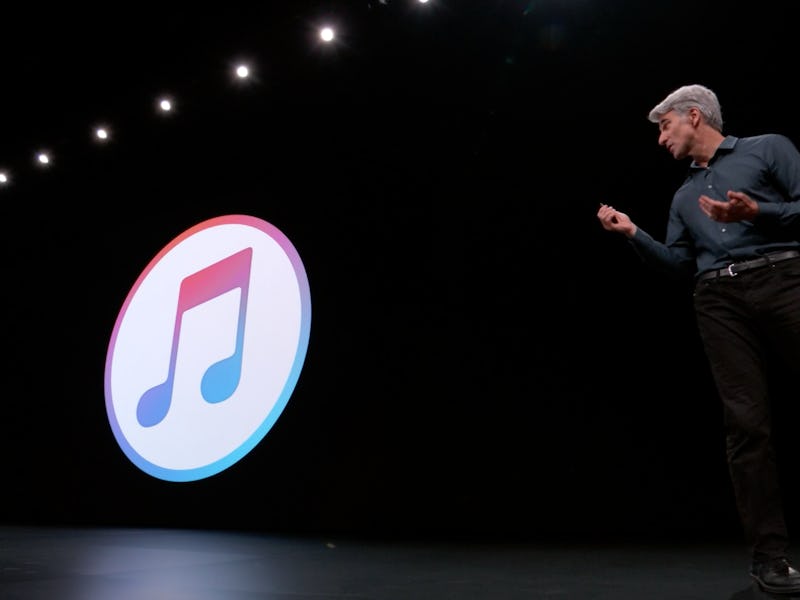The iTunes Eulogies Were Premature: WWDC 2019 Made It Better Than Ever
It's a new era for media on Macs.

After 18 years, iTunes has sung its last song. On Monday, during Apple’s 2019 Worldwide Developers Conference in San Jose, Apple’s software chief Craig Federighi announced that the iconic (and often times confusing) multimedia player will be split into three distinct programs. Nostalgic eulogies like this one were numerous.
The specific announcements made a great deal of iTunes’ demise. Federighi revealed that instead of iTunes, the desktop apps Music, Podcasts, and TV will come pre-loaded into macOS Catalina when it’s released to the public in the fall. This might mark the end of an era for an app that’s become intrinsically tied to Apple hardware for almost two decades. But the benefits to remaining iTunes diehards will extend beyond relief from frantically closing out of iTunes any time they connect an Apple device.
iTunes isn’t dead, it has simply been re-organized. And what’s more, this newly organized trio of apps will turn Apple’s hodgepodge of media players into something that users may actually understand how to use.
Federighi shows off iTunes' rebranding into Apple Music, an app narrowly focused on music.
“Apple Music in Catalina is the best music app we’ve ever made,” said Federighi. “With its singular focus on music, it’s so simple, but it has all of the powerful music features you expect from iTunes all while being blazingly fast.”
With subscription services becoming such an important factor in Apple’s business, the company was going to have to overhaul the user experience for accessing all this media in the first place. Now, instead of clicking through iTunes’ clutter of menus, users can navigate into three different tents, with features and recommendation engines that are actually catered to that given medium.
Apple Music will also still keep users’ existing library for non-streamers, while those who opt for $9.99 per month can instantly gain access to an additional 50 million tracks. In their own app, podcasts will now be searchable by keyword — even keywords spoken by the hosts during the episode — and the Podcasts app will keep track of where you left off on an episode across all of your devices. For its part, Apple TV will now serve as the video hub for HBO, Showtime, and other video content users watch on their laptop or desktops.
The answer is no, Craig.
These are natural changes all accommodate how consumers actually ingest and interact with multimedia. You don’t necessarily pair a podcast or a TV show with a workout in the same way that you would music; conversely music listeners have little need to be able to pick up where they left off in the middle of a song. When iTunes launched on January 2001, its primary objective was to sell individual songs, many at 99 cents a pop. Consumers could rip, mix, and burn music into mix CDs and the iPod.
In 2005, Apple added podcast support to its software, making it less about tunes and more an audio hub. But the line was blurred even further when the company added a Movies tab to the app in 2007, which enabled users buy and sync video content to their iPhone.
Finally, in 2010 it became abundantly clear that Apple needed a new direction. While not many people remember, that was during the ill-fated launch of Apple’s music-centric social media network, iTunes Ping, which was shut down in 2012 and replaced it with Facebook and Twitter integration. Since then, Apple has pivoted to cleaned iTunes up, as opposed to adding more, but iTunes still remained a messy marketplace miscellaneous media.
Federighi pokes fun at how iTunes might have become a little messier than Apple intended it to be.
With this major rebranding Apple will finally let the three different services that were lost inside of iTunes take shape as their own beings. This way, users know exactly where and how to look for the media they want. This will all be great for fans, even those who have avoided streaming due to their painstakingly assembled iTunes collection.
All these new features will be here soon. The macOS Catalina update with the Music, Podcasts, and TV apps will be available as a public beta in July, and its finalized version is expected to ship in the fall.